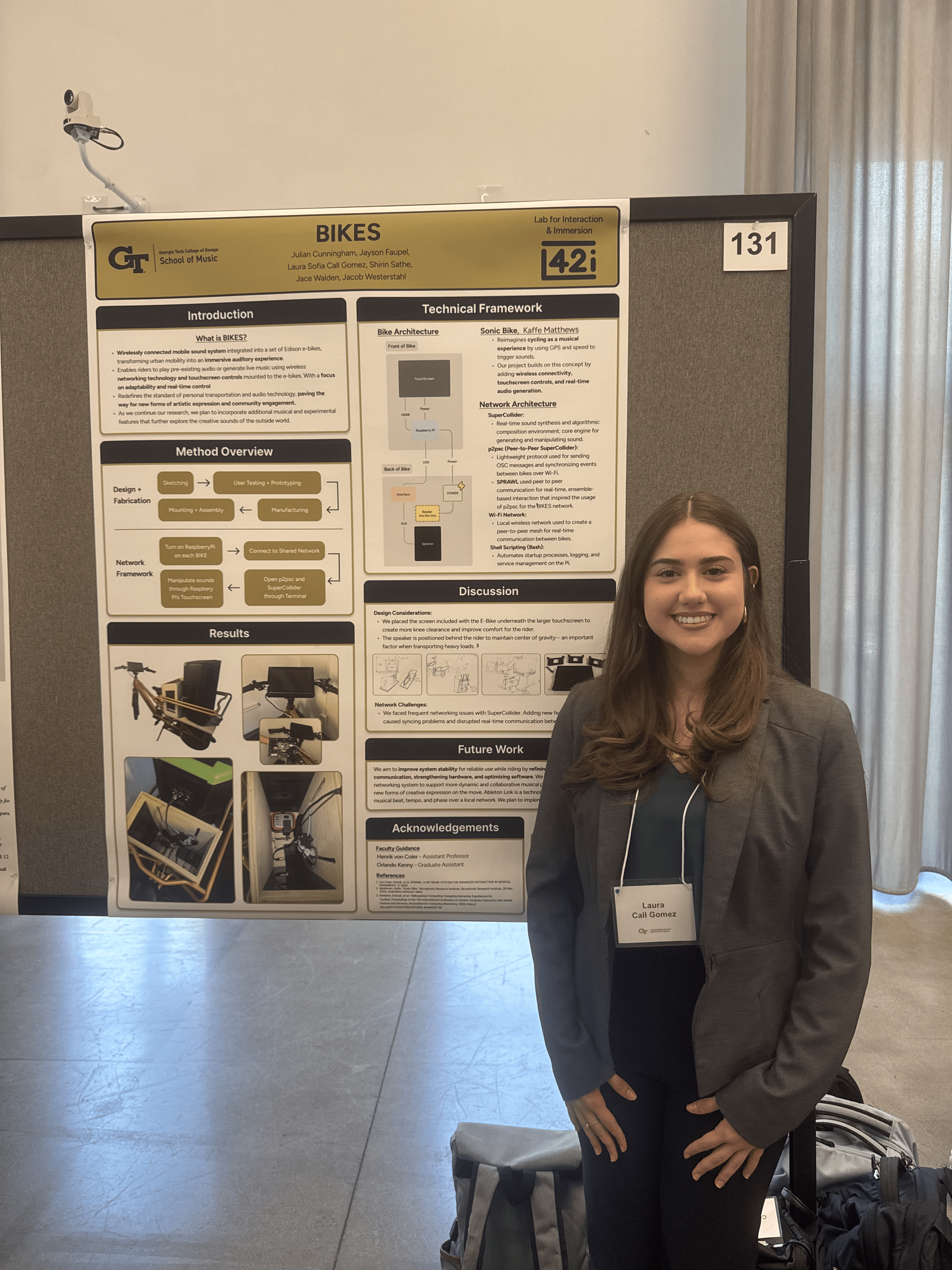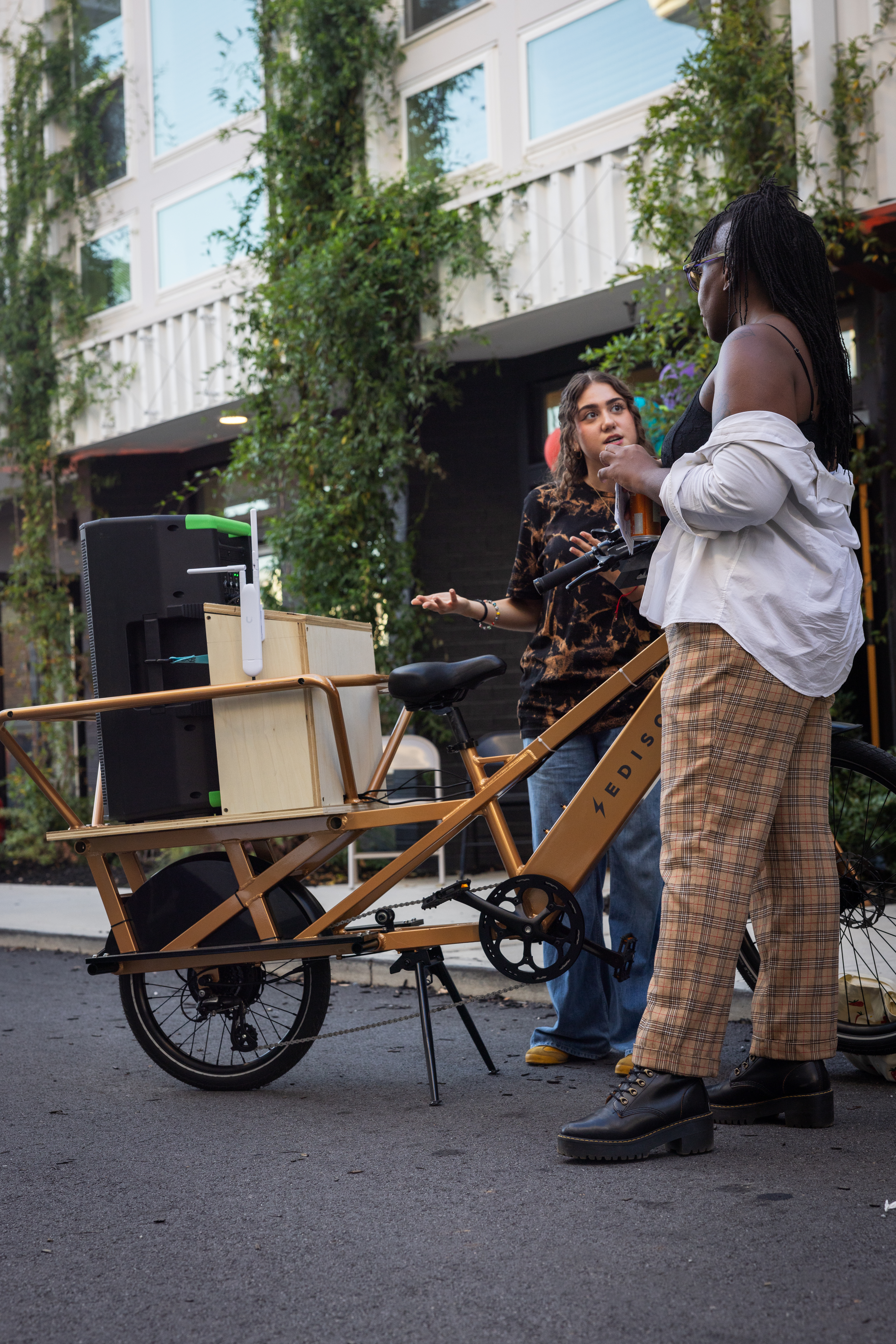Laura Call Gomez is a 2nd-year Music Technology and Electrical Engineering double major studying mobile, networked instruments for spatial music and sound art with Dr. Henrik von Coler.
How long have you been an undergraduate researcher at Georgia Tech?
I’ve been an undergraduate researcher at Georgia Tech for more than a year now. I joined the BIKES project as part of the L42i (Lab for Interaction & Immersion) research lab in January 2025. BIKES has now become a core project in the VIP “Interacting with Sound and Space,” which launched in Spring 2026..
How did you get involved with undergraduate research?
During the second semester of my first year, I wanted to get more involved in projects outside of my coursework and was looking for something meaningful to do that summer. The Georgia Tech School of Music had advertised the launch of this research project, and its concept felt relevant and exciting to me, so I decided to give it a try. I had never considered undergraduate research in music or audio technology before, so having an open mind definitely played a role in my participation. I had also heard a lot of positive experiences about research at Georgia Tech and knew I wanted to get involved at some point during my undergraduate career.

What are you working on?
The BIKES research project implements sound and spatial concepts across four electric bicycles. Each bicycle is equipped with its own sound system. including a Raspberry Pi, audio interface, speaker, and router, allowing all four bikes to be wirelessly connected through a network. Our research explores networked music performance combined with movement, while continuously opening opportunities to add new features as we improve the model.
This past summer and last semester, I co-authored two research papers. One was accepted and published at the IEEE 6th International Symposium on the Internet of Sounds (IS2). This paper presented a proof of concept for BIKES, outlined the design and development process across multiple phases, and discussed current and future applications of the system. The second paper focused on BIKES as a mobile networked instrument in interdisciplinary research and education, especially since a majority of the research group consists of undergraduate students at Georgia Tech. BIKES is also featured in a year-long exhibition at the Hartsfield-Jackson Atlanta International Airport. You can view the exhibit at Domestic Terminal T13.
One of the things I love most about this lab is how actively we engage with the community. We participate in technical events like the Georgia Tech Undergraduate Research Symposium, as well as social and public events such as the Inman Park Parade, GoatFarm SITE 2025, and Atlanta Streets Alive. It’s exciting to be part of a research project that is interactive and adaptable, whether it’s being used for music performances, parades, protests, or public exhibits.
At the beginning of my research journey with BIKES, I focused on building the first fully functioning model. We encountered several challenges, particularly with network dropouts in a moving system. This semester, our lab is developing a new iteration of the model that incorporates GPS distance and location tracking, adding an entirely new layer of interactive features. I’m currently focused on exploring creative ways to implement these new capabilities.
What is your favorite thing about research/researching?
My favorite aspect of research is the freedom to explore your interests without boundaries. You have the opportunity to investigate your ideas, test them, and share your findings in ways that can make a meaningful impact. Entering the world of research can feel overwhelming, but being able to contribute to it at such a young age has been incredibly impactful and motivating. One of the most rewarding feelings is finally getting a model to work after hours of debugging and testing.

What are your future plans and how has research influenced them?
Research has introduced me to many sound and audio technology concepts I had never considered before. I would love to expand on these ideas in the future, whether through a startup, a personal project, or continued academic research. After graduating, I plan to either pursue a master's degree or begin working in the audio technology industry as an engineer. While I’m not entirely sure of which path I’ll take, I want to pursue the opportunities that feel right at each stage. I’m very open-minded about my future and always keep my options open.
What advice do you have for students who want to be undergraduate researchers?
Don’t underestimate yourself or assume you aren’t qualified for research because you’re early in your major or feel inexperienced. Research is about stepping outside of your comfort zone and learning through exploring and experimentation. Ask a lot of questions! It can feel intimidating to speak up in a room full of experienced researchers, but asking questions is a crucial part of learning and creating a productive environment for yourself. Those questions can also spark new ideas or lead to potential solutions to problems.

